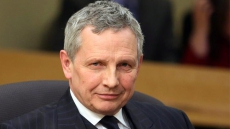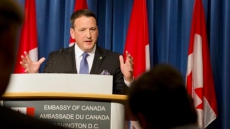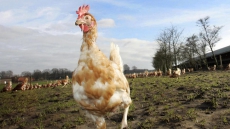VICTORIA — The British Columbia government has approved its most expensive mega project with the construction of an $8.8 billion dam on the Peace River that Premier Christy Clark says marks a historic milestone that will be felt for a century.
The controversial Site C dam project was immediately denounced by First Nations and environmental groups as "incredibly stupid," and a project "that will go down as the most expensive mistake in B.C.'s history."
The dam would be the third on the Peace River in northeastern B.C., flooding an 83-kilometre stretch of valley near Fort St. John. The power project has been part of B.C.'s long-range energy options since 1958.
"In the life of any province there are moments where each of us has an opportunity, a responsibility, to make big decisions, ones that are going to matter," Clark said a news conference on Tuesday. "In this case for a century, and today is the day."
Her government arrived at the decision after careful analysis, Clark said.
"It was not an easy decision to come to. In order for our economy to grow, we need to ensure there is power."
The dam will bring clean, reliable and affordable power to the province, she added.
While the province is the leader in North American in energy conservation, Clark said that doesn't eliminate the need for new energy.
Energy and Mines Minister Bill Bennett said the decision to go ahead with the project is what's best for ratepayers. Construction is set to start in the summer of 2015 and the dam is expected to be complete and in operation in 2024, he said.
The projected cost has increased from $7.9 billion to $8.75 billion. A delayed start, tax changes and an added contingency fund of $440 million to cover unforeseen expenses over the eight-year construction period account for the increased estimate, Bennett said.
Last spring Bennett said the $7.9 billion estimate was solid and estimates from BC Hydro, the Crown corporation building the project, came with an adequate buffer to cover rising costs.

Opposition New Democrat Leader John Horgan seized upon the rising estimates and said costs could go even higher.
"This is a $9 billion gamble from a premier who we can't take at her word," said Horgan, who called for a genuine, independent review of the project by the BC Utilities Commission. "I'm not convinced we've seen the final number on this."
The dam's environmental impact statement forecasts flooding of more than 5,550 hectares of land, of which at least 3,800 hectares is agricultural land. The project will also flood First Nations heritage sites and force up to 20 families — many life-long ranchers — to move.
The flooding of some Treaty 8 First Nation territory is something Chief Bob Chamberlin, the vice-president of the Union of B.C. Indian Chiefs, said crystallizes the disregard for aboriginal and treaty rights in B.C.
The union's president, Grand Chief Stewart Phillip, said in a news release that BC Hydro has failed to make its case in terms of future energy demands.
"This is an ill-advised and incredibly stupid decision the province has made regarding the Site C Project," he said.
Joy Foy of the Wilderness Committee said the B.C. government's decision to build the dam "will go down as the most expensive mistake in B.C.'s history."
Bennett said earlier that he doesn't expect First Nations to publicly endorse Site C, but he was hopeful benefit agreements could be negotiated. He said First Nations companies and people could profit greatly from the project through construction contracts and jobs.
Last fall, some First Nations in northeast B.C. issued the government an ultimatum, saying it must decide between developing the liquefied natural gas industry or Site C. They can't have both, they said.
The proposed dam is located in the heart of the province's natural gas fields, where drilling will occur and pipelines to B.C. northwest will be built.
The project has been undergoing public reviews since 2007. The Crown Owned BC Hydro said it reached a major milestone recently when it received federal and provincial environmental certificates — as long as more than 80 conditions are met before it proceeds.
Last spring's joint review panel report weighing the project found the dam would cause significant adverse effects on the environment and wildlife, as well as aboriginals, farmers and other users of the Peace River valley.
But the benefits are clear and the alternatives, few, the panel appointed by the Canadian Environmental Assessment Authority said in its 471-page report.
The panel gave no clear yes or no answer, but said B.C. will need new energy and new capacity at some point. The dam on the Peace River would provide a large amount of inexpensive power, low in greenhouse gas emissions, it said.





